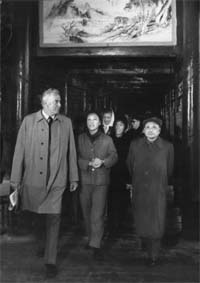What an exciting time that was – I’ll never forget the first week, with the decisions taken to get the troops out of Vietnam and establish relations with Beijing. But in fact, while mutually beneficial, the relationship was pretty narrowly based, reflecting the nature of the China of those days, so different from the one we now know. But there was a vision, and we are indebted to the people on both sides who got things started.
The real difference came with opening and reform and we saw the relationship take off with Bob Hawke as Prime Minister and Ross Garnaut as Ambassador. These were great days that set developments on their present track.
After the trough caused by the events of 1989, the next big boost to the relationship came with Deng Xiaoping’s famous journey to the south, after which reform and opening returned with a vengeance. It was this that enabled the fully- fledged relationship we now enjoy, multi-faceted and rich – rich not only in terms of financial flows, but in personal ties and sheer variety.
I want to note two features of the bilateral relationship as it has developed here in Australia. The first is that it has enjoyed a high degree of popular support. The opening to China in the early 70s, still in the throes of the cultural revolution, reflected, and was in part a product of, our own more benign cultural revolution, when geography started to become at least as important as history in terms of our own self-understanding and ideas about where our future lay.
Australian tourism to China also reflected this – in terms of population per capita, for years Australian tourists outnumbered those from other countries, and the same people visited and re-visited China, not content with just one visit. This also illustrates the well-known fact that left to their own devices, Australians and Chinese generally get on very well with each other.
The second feature is that at the domestic political level, China policy has been essentially bi-partisan. There were a few hiccups such as we saw in the first months of the Howard government, but things soon settled down. This has served us, and China, very well, providing this crucial relationship with stability and predictability. So it’s disturbing to see signs of this breaking down recently. This goes absolutely against Australian national interests. One can only hope that this is a temporary phenomenon, and that good sense and an appreciation of where our interests lie are restored as soon as possible.
There is no denying that there have been some problems over the last year, some more important than others: the events in Tibet; negative reactions to the defence of the Olympic torch (these two being closely interrelated); the misadventures of the former defence minister; the defence white paper; the failed Chinalco investment; the arrest of Stern Hu; and the visit of Rebiya Kadir.
But there are two points that I want to make here. The first is that these events, and their media coverage, masked the continuation of much more substantive developments that continued throughout this period, and continue as we speak.
The second point is that this all fed into a more negative discussion of China that we’ve seen here for a long time. The television advertisements regarding the proposed Chinalco investment reached a new low in abysmal ignorance and prejudice; some MPs hardly covered themselves with glory; the media, with a few honourable exceptions, also played a rather negative role.
My problem is not with the debate as such. On the contrary, it’s essential. The rise of China, or rather the return of China, is a huge phenomenon, involving major realignments of power and influence. Things are changing. We need to make our own judgments about what is best for Australia, and what Australia can best do.
But let the debate be well informed!
Part of the problem is this. Up until the last year or so, the serious discussions about China took place in relatively rarified and reasonably well-informed circles: policy makers; elite journalists; senior business people; and academics.
Most people didn’t think much about China at all, other than what to get at the takeaway or where to go for the big holiday, along with a general sense that China was good for Australia’s prosperity. The rise of China has now reached such a stage, globally, that it’s impacting on wider and wider circles. To put it crudely, is ‘in your face’ in an unprecedented way.
So it’s not surprising that suddenly a lot more people are talking, if not necessarily thinking, about China, and that the discussion is not necessarily very well informed. It lacks context.
In terms of context, I believe it would be very helpful if we could have a high-level (that is, Prime-Ministerial-level – he’s the man to do it, as he demonstrated in his two Brookings speeches) articulation of a more comprehensive view of how Australia should relate to China and the growth of its power and influence.
Of course it’s not just the Prime Minister, though. We all have our own responsibilities in this regard.
Many challenges lie ahead, and more mistakes will be made. But given the strong complementarities between China and Australia, we should approach our bilateral future with confidence.
Dr. Richard Rigby is Executive Director of the ANU China Institute and was formerly an Australian diplomat and analyst specialising on Chinese and Asian affairs. This is a digest of his presentation to ‘Australia-China Investment Forum’, hosted by the Australia-China Business Council in Sydney on 24 September 2009.

